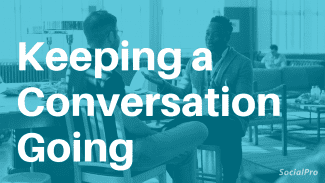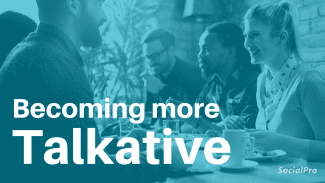Do you often get stuck in dull conversations or struggle to think of something to say when a conversation begins to die?
Fortunately, you can turn most conversations around if you know what kinds of questions to ask and what topics to bring up.
In this article, you’ll learn how to spark up a conversation, how to avoid being boring, and how to make a conversation flow again if it’s starting to dry up.
Sections
How to make interesting conversations
To hold better conversations, you need to learn several skills: asking good questions, looking for common interests, active listening, sharing things about yourself, and telling attention-grabbing stories.
Here are some general tips that will help you make interesting conversations in social situations.
1. Ask something personal
At the beginning of a conversation, a few minutes of small talk helps us to warm up. But you don’t want to get stuck in trivial chit-chat. To move beyond small talk, try to ask a personal question that relates to the topic.
A rule of thumb is to ask questions that contain the word “you.” Here are some examples of how to make conversations more interesting by transitioning from small talk topics to more exciting subjects:
- If you’re talking about unemployment figures, you could ask, “What would you do if you decided to follow a new career path?”
- If you’re talking about how cold and unpleasant the weather has been recently, you could ask, “If you could live anywhere in the world, where would you pick?”
- If you’re talking about economics, you could ask, “What would you do if you had an unlimited amount of money?”
2. Make it a mission to learn about people you meet
If you challenge yourself to learn something about people when meeting them for the first time, you’ll enjoy the conversation more.
Here are 3 examples of things you can try to learn about someone:
- What they do for a living
- Where they are from
- What their future plans are
You can challenge yourself to ask people about these things when it feels natural. Having a mission gives you a reason to talk to someone and helps you uncover things you have in common.
3. Share something slightly personal
One of the most popular conversation tips is to let the other person do most of the talking, but it’s not true that people ONLY want to talk about themselves.
People also want to know who they are talking to. When we share slightly personal things with each other, we bond faster.[2]
In addition, most people don’t like to be asked lots of questions by someone who doesn’t share much in return. If you bombard someone with questions, they might start to feel as though you’re trying to interrogate them.
Here’s an example of how to make a conversation interesting by sharing something about yourself:
You: “How long did you live in Denver?”
Other person: “Four years.”
You, sharing something slightly personal: “Cool, I have relatives in Boulder, so I have many nice childhood memories from Colorado. What was it like for you to live in Denver?”
4. Focus your attention on the conversation
If you get stuck inside your own head and freeze up when it’s your turn to say something, it may help to deliberately focus your attention on what the other person is actually saying.
For example, let’s say you’re talking to someone who tells you, “I went to Paris last week.”
You might start worrying and start thinking things like, “Will they look down on me for not having been to Europe? What should I say in response?” When you get caught up in these thoughts, it’s hard to think of things to say.
When you notice yourself getting self-conscious, bring your focus back to the conversation. This makes it easier to be curious[3] and come up with a good response.
To continue with the example above, you might start thinking, “Paris, that’s cool! I wonder what it’s like? How long was their journey to Europe? What did they do there? Why did they go?” You could then ask questions such as, “Cool, what was Paris like?” or “That sounds amazing. What did you do in Paris?”
5. Ask open-ended questions
Closed-ended questions can be answered with a “Yes” or “No,” but open-ended questions invite longer answers. Therefore, open-ended questions are a useful tool when you want to keep a conversation going.
For example, “How was your vacation?” (an open question) encourages the other person to give a more in-depth answer than “Did you have a good vacation?” (a closed question).
- Ask “What,” “Why,” “When,” and “How”
“What,” “Why,” “When” and “How” questions can shift a conversation away from small talk toward deeper topics. Good questions encourage the other person to give you more meaningful answers.[4]
Here’s an example showing how you can use “What,” “Why,” “When,” and “How” questions in a conversation:
Other person: “I’m from Connecticut.”
“What” Questions: “What’s it like to live there?” “What do you like the most about it?” “What was it like to move away?”
“Why” Questions: “Why did you move?”
“When” Questions: “When did you move? Do you think you’ll ever move back?”
“How” Questions: “How come you moved?”
7. Ask for a personal opinion
It’s often more stimulating to talk about opinions than facts, and most people like to be asked for their opinions.
Here are some examples that show how to make a conversation fun by asking someone for their opinions:
“I need to buy a new phone. Do you have a favorite model you could recommend?”
“I’m thinking of moving in with two friends. Do you have any experience with co-living?”
“I’m looking forward to my vacation. What’s your favorite way to wind down?”
8. Show interest in the other person
Use active listening to signal that you care about what the other person has to say. When you show that you are interested, conversations tend to become deeper and richer.
Here’s how to show that you are paying attention to what the other person is saying:
- Keep eye contact whenever the other person is talking to you.
- Make sure your body, feet, and head are pointing in their general direction.
- Avoid looking around the room.
- Say “Hmm” when appropriate to show that you’ve heard them.
- Summarize what they said. For example:
Other person: “I didn’t know if physics was right for me, so that’s why I started painting instead.”
You: “Painting was more ‘you,’ right?”
Other person: “Yes, exactly!”
9. Use eye contact to show that you are present in the conversation
It can be tricky to keep eye contact, especially if we feel uncomfortable around someone. But lack of eye contact can make people think that we don’t care what they have to say. This will make them reluctant to open up.
Here are some tips to help you make and keep eye contact:
- Try to note the color of their iris and, if you’re close enough, its texture.
- Look in between their eyes or at their eyebrows if direct eye contact feels too intense. They won’t notice the difference.
- Make it a habit to keep eye contact whenever someone’s talking.
When people aren’t talking—for example, when they are taking a quick break to formulate their thoughts—it can be a good idea to look away, so they don’t feel pressured.
10. Look for things in common
If you think you might have something in common with someone, such as an interest or a similar background, mention it and see how they react. If it turns out that you have something in common, the conversation will be more engaging for both of you.[1]
If they don’t share your interest, you can try mentioning something else later in the conversation. You might come across mutual interests more often than you think.
Other person: “How was your weekend?”
You: “Good. I’m taking a weekend course in Japanese, which is very engaging”/“I just finished reading a book about the Second World War”/“I started playing the new Mass Effect”/“I went to a seminar about edible plants.”
Try making educated guesses to see if you have something in common with someone.
For example, let’s say that you meet this person, and she tells you that she works in a bookstore. From that piece of information alone, what are some assumptions we can make about her interests?

Perhaps you’ve made some of these assumptions:
- Interested in culture
- Prefers indie to mainstream music
- Likes to read
- Prefers to shop for vintage items instead of buying new things
- Vegetarian
- Prefers cycling over driving
- Environmentally conscious
- Lives in an apartment in a city, maybe with friends
These assumptions might be totally wrong, but that’s OK because we can put them to the test.
Let’s say that you don’t know much about books, but you do enjoy talking about environmental issues, and you think that’s a topic she’d also find interesting. You might say, “What’s your view on e-readers? I guess they have less of an impact on the environment than books, even though I prefer the feel of a real book.”
Maybe she says, “Yeah, I don’t like e-readers either, but it’s sad that you need to cut down trees to make books.”
Her answer will tell you whether she’s concerned about environmental issues. If she is, you can now segway into talking about that.
Or, if she seems indifferent, you can try another topic. For example, if you’re also interested in bikes, you could talk about cycling, ask if she bikes to work, and what bike she would recommend.
Here’s another person you can try with:

Let’s say you meet this woman, and she tells you that she works as a manager at a capital management firm. What assumptions can we make about her?
Obviously, these assumptions will be very different from those you’d make about the girl above. You might make some of these assumptions:
- Interested in her career
- Reads management literature
- Lives in a house, maybe with her family
- Health-conscious
- Drives to work
- Has an investment portfolio and is concerned about the market
Here’s another one:

This guy tells you that he works in IT security. What would you say about him?
Perhaps you’d say:
- Computer savvy
- Interested in technology
- Interested in (obviously) IT security
- Plays video games
- Interested in movies like Star Wars or other sci-fi or fantasy
Our brains are really good at coming up with assumptions about people. Sometimes, that’s a bad thing, like when we make judgments rooted in prejudice.
But here, we’re using this extraordinary ability to connect faster and make interesting conversations. What is interesting to us that we also might have in common with them? It doesn’t have to be our top passion in life. It just needs to be something that you enjoy talking about. That’s how to make chat interesting.
In summary:
If you want to learn how to start a conversation and make friends, practice looking for mutual interests. Once you have established that you have at least one thing in common, you have a reason to follow up with them later and ask them to hang out.
Remember these steps:
- Ask yourself what the other person might be interested in.
- Discover mutual interests. Ask yourself, “What might we have in common?”
- Test your assumptions. Move the conversation in that direction to see their reaction.
- Judge their reaction. If they are indifferent, try another subject and see what they say. If they respond positively, delve into that topic.
11. Tell interesting stories
Humans love stories. We might even be hardwired to like them; our eyes dilate as soon as someone starts telling a story.[5]
Just by saying, “So, a few years ago I was on my way to…” or “Have I told you about that time I…?”, you are tapping into the part of someone’s brain that wants to hear the rest of the tale.
You can use storytelling to connect with people and be seen as more social. People who are good at telling stories are often admired by others. Other studies show that stories also will make people feel closer to you by being able to relate to you.[6]
A recipe for successful storytelling
- The story needs to relate to the situation. Memorize your good stories. Stockpile them over time. Stories are timeless, and a good one can and should be told several times to different audiences.
- Talking about how good or capable you are will put people off. Avoid stories where you come off as the hero. Stories that show your vulnerable side work better.
- Give your audience enough context. Explain the setting so that everyone can get into the story. We’ll look at this in the example below.
- Talk about things that others can relate to. Tailor your stories to fit your audience.
- Every story needs to end with a punch. It can be a small punch, but it has to be there. We’ll come back to this in a moment.
It’s important to realize that people with a lot of stories don’t necessarily live more fascinating lives. They just present their lives in an interesting way.
Here’s an example of a good story:
So a few days ago, I wake up with a day of important exams and meetings ahead of me. I wake up feeling really stressed because apparently, the alarm clock has already gone off.
I feel totally exhausted but try to prepare myself for the day, taking a shower and shaving. However, I just can’t seem to wake up properly, and I’m actually throwing up a little on my way out of the bathroom.
I become afraid of what’s happening but I prepare breakfast and I get dressed. I’m staring at my porridge but can’t eat and want to throw up again.
I’m picking my phone up to cancel my meetings, and only then do I realize that it’s 1:30 AM.
This story isn’t about an exceptional event; you’ve probably been through several similar things in your life. However, it shows that you can turn everyday situations into an entertaining story.
Note the following points:
- In the example, the storyteller doesn’t try to look like a hero. Instead, they tell the story of a struggle.
- It ends with a punch. A punch is often the difference between awkward silence and laughter.
- Notice the pattern: Relatable -> Context -> Struggle -> Punch
Read this guide on how to tell a good story.
12. Use a series of questions to go beyond small talk
When you’ve been talking to someone for a couple of minutes, you can steer away from casual chit-chat by asking a series of slightly personal questions that move the conversation to a deeper level.
You can then start asking questions that help you get to know the other person better and discover what you have in common.
Here’s a sequence of questions you can try. Note that you don’t have to ask all of these questions. Think of this sequence as a starting point rather than a rigid template. You can always talk about other topics if they come up.
- “Hi, I’m [Your name.] How are you?”
Start the conversation on a friendly note with a safe, neutral phrase that includes a question.
- “How do you know the other people here?”
This question can be used in most situations where you meet strangers. Let them explain how they know people and ask relevant follow-up questions. For example, if they say, “I know most of the people here from college,” you could ask, “Where did you go to college?”
- “Where are you from?”
This is a good question because it’s easy for the other person to answer, and it opens up many avenues of conversation. It’s useful even if the person is from the same town; you can talk about which part of town they live in and what it’s like living there. Perhaps you’ll find a commonality. For example, maybe you’ve both visited similar local attractions or like the same coffee shops.
- “Do you work/study?”
Some people say that you shouldn’t talk about work with people you just met. It can be boring to get stuck in job talk. But knowing what someone is studying or working with is important for getting to know him or her, and it’s often easy for them to expand on the topic.
If they are unemployed, just ask what work they would like to do or what they want to study.
When you’re done talking about work, it’s time for the next question:
- “Are you very busy at work, or will you have time for a vacation/holiday soon?”
When you’ve arrived at this question, you’re past the hardest part of the conversation. Whatever they say, you can now ask:
- “Do you have any plans for your vacation/holiday?”
Now you’re tapping into what they like to do in their own time, which is interesting for them to talk about. You may discover mutual interests or discover that you’ve visited similar places. Even if they don’t have any plans, it’s fun to talk about how they spend their free time.
Interesting conversation starters
If you often feel stuck when you’re trying to strike up a conversation with someone, it may help to memorize a few conversation starters.
It’s a good idea to use a conversation starter that ends with a question. That’s because questions encourage the other person to open up and make it clear that you’d like a two-way conversation.
Here are some interesting conversation starters that you can adapt to suit many different types of social situations.
- Comment on your surroundings, e.g., “I love that painting over there! What do you think of it?”
- Comment on something that’s about to happen, e.g., “Do you think this exam is going to be tough?”
- Give a sincere compliment, followed by a question, e.g., “I like your sneakers. Where did you get them?”
- Ask the other person how they know the other people at an event, e.g., “How do you know the host?”
- Ask the other person for help or a recommendation, e.g., “I’m not sure how to work this fancy-looking coffee machine! Could you help me out?”
- If you’ve spoken to the other person on a previous occasion, you could ask them a question related to your last conversation, e.g., “When we spoke last week, you told me you were looking for a new place to rent. Have you found anything yet?”
- Ask the other person how their day or week has been going so far, e.g., “I can’t believe it’s Thursday already! I’ve been so busy, the time has flown by. How’s your week been?”
- If it’s nearly the weekend, ask about their plans, e.g., “I’m definitely ready to take a couple of days off. Do you have any plans lined up for the weekend?”
- Ask for their opinion on a local event or change that is relevant to both of you, e.g., “Have you heard about the new plans to completely re-landscape our communal garden?” or “Did you hear that the head of HR resigned this morning?”
- Comment on something that’s just happened, e.g., “That class finished half an hour late! Does Professor Smith usually go into so much detail?”
If you’d like some more ideas, use this list of 222 questions to ask to get to know somebody to help you start an engaging conversation.
Interesting conversation topics
It can be difficult to think of conversation topics when you’re talking to someone, particularly if you are nervous. In this section, we’ll look at some topics that work well in most social situations.
FORD topics: Family, occupation, recreation, and dreams
When a conversation gets boring, remember the FORD topics: Family, occupation, recreation, and dreams. The FORD topics are relevant to almost everyone, so they are good to fall back on when you aren’t sure what to say.
You may be able to mix FORD topics together. Here’s an example of a question that relates to occupation and dreams:
Other person: “Work is so stressful now. We are so understaffed.”
You: “That sucks. Do you have a dream job you’d love to do?”
General conversation topics
Aside from FORD, you could talk about some of these general topics:
- Role models, e.g., “Who inspires you?”
- Food and drink, e.g., “Have you been to any good restaurants lately?”
- Fashion and style, e.g., “I love your bag! Where did you get it?”
- Sport and exercise, e.g., “I’ve been thinking about joining the local gym. Do you know if it’s any good?”
- Current affairs, e.g., “What did you think of the most recent presidential debate?”
- Local news, e.g., “What do you think of the new landscaping they’ve done in the local park?”
- Hidden skills and talents, e.g., “Is there something you’re really good at that surprises people when they find out?”
- Education, e.g., “What was your favorite class at college?”
- Passions, e.g., “What’s your favorite thing to do outside of work?” or “What’s your idea of a perfect weekend activity?”
- Upcoming plans, e.g., “Are you planning anything special for the holidays?”
Previous topics
Good conversation doesn’t have to be linear. It’s completely natural to revisit something you’ve already talked about if you reach a dead-end and there’s a silence.
Here’s an example that shows how you can make a dying chat interesting again by circling back around to an earlier topic:
Other person: “So, that’s why I prefer oranges over apples.”
You: “Oh, I see…”
Other person: “Yeah…”
You: “You mentioned earlier that you recently went canoeing for the first time. How was it?”
Controversial topics
One common piece of advice is to avoid sensitive topics when you haven’t known someone for very long.
However, these subjects are interesting and can inspire some good conversations. For example, if you ask someone, “What’s your view of [political party]?” or “Do you agree with the death penalty?” the conversation will probably get livelier.
But it’s important to learn when it is OK to talk about controversial issues. If you introduce them at the wrong time, you may upset someone.
Controversial topics include:
- Political beliefs
- Religious beliefs
- Personal finances
- Intimate relationship topics
- Ethics and lifestyle choices
In general, it’s OK to talk about these subjects when:
- Both of you are already comfortable sharing opinions about less controversial topics. If you’ve been sharing views on a few other subjects, you probably feel safe enough to move on to more sensitive issues.
- You are prepared to deal with the possibility that the other person’s views might offend you.
- You are willing to listen, learn, and respect the other person’s opinions.
- You are in a one-on-one conversation or in a group where everyone is comfortable with one another. Asking someone for their opinions in front of other people can make them feel awkward.
- You can give the other person your full attention. Look for signs that it might be time to change the subject, such as an inability to look you in the eye or shuffling from side to side.
Memorize a useful phrase to redirect a conversation that has become tense or difficult. For example, “It’s interesting to meet someone who holds such different views! Maybe we should talk about something a bit more neutral, like [insert uncontroversial topic here].”
























thanks for the part on what to think about them!
Thanks so much, this article has helped me so much with my SM
Wow, I have been looking for this information for many many years, the number of times I have googled for these answers/bought books on what I hoped would be the information I was looking for and now the time has come, someone has the answers, thank you, thank you, thank you! I would love to buy your book just so I have it close by to pick up right before I head out to an event, I couldn’t see a book by you so have instead bookmarked this page ????
This is so educational and worth praising due to the stating if words and hardwork.Great job
I would like to learn more about most things.
Under the “Emma, works in a bookstore” example, “segue” is spelled as “segway”.
I really like the work you’re doing here; I can’t imagine writing so many of these incredibly informative and detailed articles being easy but I hope this helps!
Lucas
so i have never been a person who has social anxiety or has problems speaking to a person but lately when i got into a relationship with a person i sometimes find it hard to find things to speak about or things to keep the conversation running……..plz help me if u know a solution to my problem
i love this site so much because its helping me realize so many new thing thank you so much David Morin 🙂
Thank you Jessica! I’m happy it’s helpful to you 🙂
when ever I tried to talk to someone I know I become anxious and shut up.At that time no word come from my mouth but after I went from there I think tomorrow I will talk and feel comfortable and next day the same thing happen.Even sometimes I become confuse how to start talk to my close friends.
And I think that Im depressed.
when ever I tried to talk to someone I know I become anxious and shut up.At that time no word come from my mouth but after I went from there I think tomorrow I will talk and feel comfortable and next day the same thing happen.Even sometimes I become confuse how to start talk to my close friends.
And I think that Im depressed.
These are solid tips! I can’t wait to further practice my conversation skills! I already started today after reading another blog post! This shy extrovert is excited to learn and apply her new knowledge!!
I find it hard at times to include myself in conversations. Even 1 on 1 conversations with strangers is challenging. I desire to be able to be more socially friendly and effective in sharing myself with others. My main challenge is from how I grew up – introverted and suppressed in life. I am currently 44 yrs old and desire to see my life change. I desire good friends and good social experiences in life.
Just watched your video on getting into more personal conversation topics and felt inspired! Some things I would like to be better at in conversation are eye contact, and choosing the right conversation for the right time (ex do people talk about vacations or their dream jobs at parties or social outings? Can I ask about people’s pets with my colleagues?) Sometimes I feel like you have to choose the right topic for the right scenario. Thanks!
I recently moved to a new city. Die to cost considerations, I’m stuck in a primarily Retail/Commercial area. I also work at a small store, where I’m essentially alone for most of my shift, and I dont have much in common with the people I work with
I have a bicycle, but currently can’t afford a car, but that may change soon. Feeling isolated, and its hard to get to places for meetups or meeting people. Any suggestions on how I can meet new people?
Hi, Thanks for your helpful contents. I am so shy in social situations. for example in the work or even at home everybody says why you don’t speak. that’s so hard for me. I don’t know what to do.
This is both very illuminating and useful information. I love to read your articles.
The thing is I work as a dentist. I love to connect more with my patients and get to know them better. However, it is hard to work in someone’s mouth and let them talk at the same time. Do you have any tip?
Thanks
L
I work as a cashier. The problem is, how do I figure out what the person does to guess their interests? Should I just ask them what they do david?
Make an assumption just like we did in the exercise in the article. But if you’re talking with a customer, the conversation might be too short in its nature to actually make it deeper. It’s not very practical in that situation, I think this method is better for a longer 1-on-1 conversation where you are not customer-cashier.
How do you make an assumption without previous knowledge? Just on how they look?
Looks, clothes, the area/place/city you see them in, accent, body language, age. There’s lots of information to make assumptions, of course, a lot of your assumptions will be wrong, but once you get started talking you will get more and more information to help guide you. You also get better at guessing correctly the more people you talk and practice with.
Thanks for the response. I’ll try it out
I do this kind of stuff when talking to people all the time, making assumptions about their interests snd stuff… usually im dead on. This is like being a conversation samurai or something… whether or not it makes people like me, i cant really tell. I think the important thing is to just be real and unafraid of offending people, especially if you ever want to end up with sincere bonds with others.
I am trying to connect with old friends this way (because when you grow up, you usualy change – so sometimes it feel like you don’t know each other anymore). But it’s hard when you sometimes think that the other person hold grudges against something. Is there a way to get past that? Like.. ..what can you say?
I think also with my trauma that i forgotten memories that are really important to the other person.. (like, old internjokes) but i feel embaresed to tell that; that they need to refresh my memory. And the mode gets real awkward. Ideas?
Omg, i just realice thats when i get back in my head and it gets silent. But I don’t think I’m comfortable to just tell the truth either..
Sorry for the novels.. ?
Your comments and “novels” are always welcome here 🙂
It’s hard to say, it depends on if they actually seem to hold a grudge or if you are just afraid that they are?
And about the other thing, I don’t think you need to be embarrassed that you forgot or don’t understand a joke. Everyone forgets stuff like that or they just don’t get it, many times people just pretend like they understand 😛
Good ?
Both I think. Both that I are afraid some of them are and that some of them acctually are. When you hit the wall you can’t be there for people like you should even if your physically there, because you’re mentaly finished and can be for a long time. So it’s kind of a trust you break “to be there”. I think. And it’s hard to get that trust back – some people maybe “moved on”. But who your stil connected to.
I think you can only do so much. You can only be yourself, be honest and kind. If they still hold a grudge against you it’s probably time to move on. Some people don’t want to understand.
Great advice – thanks!
Wow this is so realistic. I’m basically an introvert but this can get me a few friends. Thankyou David?
I hope so Azeem, glad you like it!